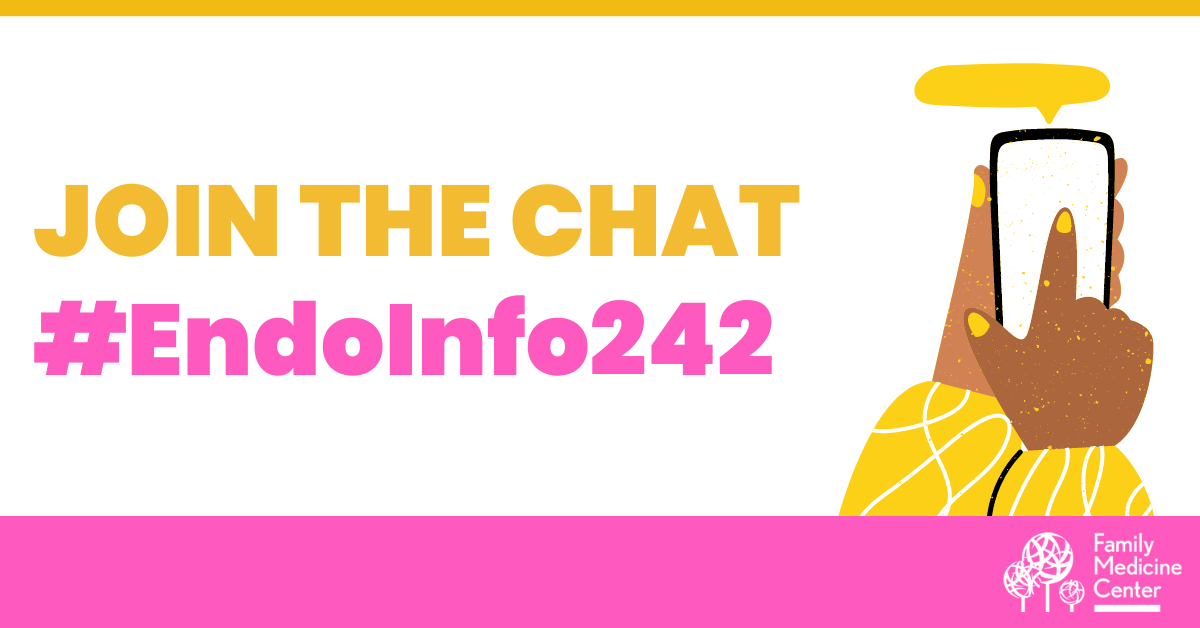Here we answer some commonly asked questions about endometriosis. Join the chat using #EndoInfo242
Q: What is endometriosis?
The lining of your uterus is called the endometrium. Endometriosis is a disorder in which tissue similar to the lining of your uterus grows outside of your uterine cavity.
Endometriosis occurs when endometrial-like tissue grows on your ovaries, bowel, and tissues lining your pelvis.
There are four stages of endometriosis that determine the stage of the disorder; minimal, mild, moderate and severe.
Q: What does Endometriosis feel like?
Endometriosis is widely known for causing physical pain, but it can cause emotional distress as well. Many endo patients report increased stress, anxiety and depression because of their disorder.
Pain similar to menstrual cramps tends to be the most severe just before, and during, your period.

Endometriosis can cause:
- pelvic pain
- painful periods
- cramps 1 or 2 weeks around menstruation
- heavy menstrual bleeding or bleeding between periods
- infertility
- pain during sexual intercourse
- discomfort with bowel movements
- lower back pain that may occur at any time during your menstrual cycle
- stress, anxiety, depression
Q: What can I do to live well with endometriosis?
Talk to a professional.
It’s not all in your head. But for many women, endometriosis can go years before being properly diagnosed. This is mainly due to their symptoms being mistaken for something else, or their inability to properly connect with their healthcare provider.
It’s important to visit a facility that trusts your symptoms and can properly diagnose and treat endometriosis. And if you feel you’re having symptoms of endometriosis, be sure to discuss it during your next gynecological or physical exam.

Eat right & stay hydrated.
Choose lean protein, whole grains and fresh produce as much as you can. Many patients with endometriosis report less severe symptoms while avoiding alcohol and caffeine and eating a gluten-free diet that limits trans and saturated fats.
Studies also show an increased amount of leafy greens and omega-3 fatty acids can benefit patients with endometriosis. Find omega-3’s in oily fish like salmon, herring and mackerel or plant-based foods like seaweed, walnuts, brussels sprouts or flax seeds.
It’s also important to drink enough water throughout the day. Aim to drink at least 70 oz of water daily or more if you’re very active or the weather is very hot. Always talk to your doctor before making any dietary changes.
Move your body & get enough rest.
Get exercise in whatever way responds best to your body. On days where you’re in pain, try movements like walking, stretching or a gentle yoga practice. Strength training and HIIT exercises can also be great to clear your mind and better your mood.
Rest your body by taking rest days from the gym or exercise and be sure to get enough quality sleep. Poor sleeping habits can make endometriosis symptoms worse.

Join the chat using #EndoInfo242
Do you or someone you know have Endometriosis? Get the information, support and professional care you need. Talk to us. Nassau: Call 702-9310 or click here. Eleuthera: Call 334-2500 or click here.

